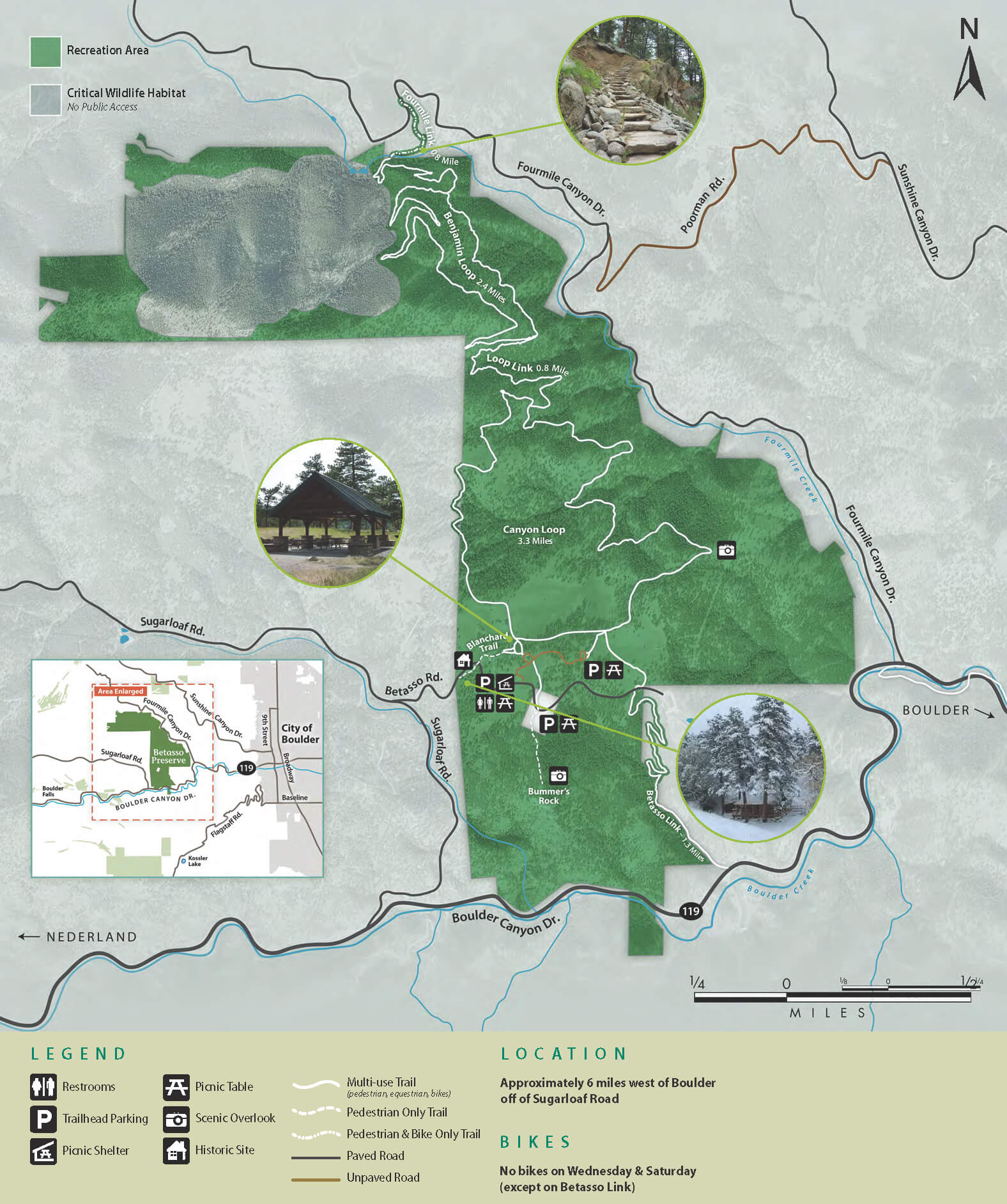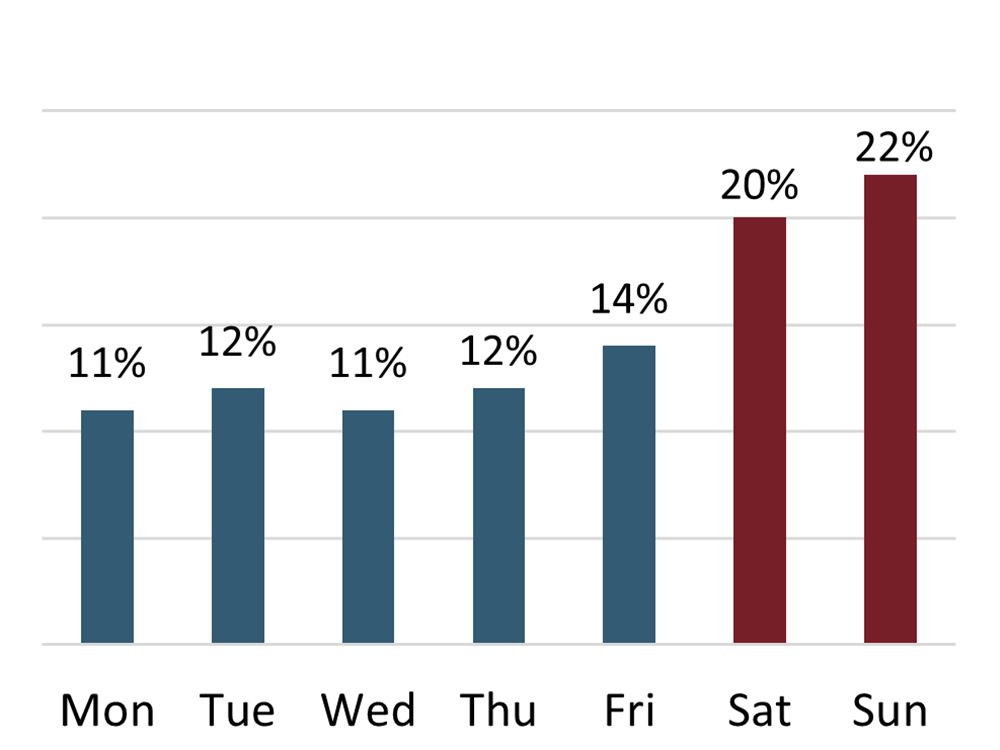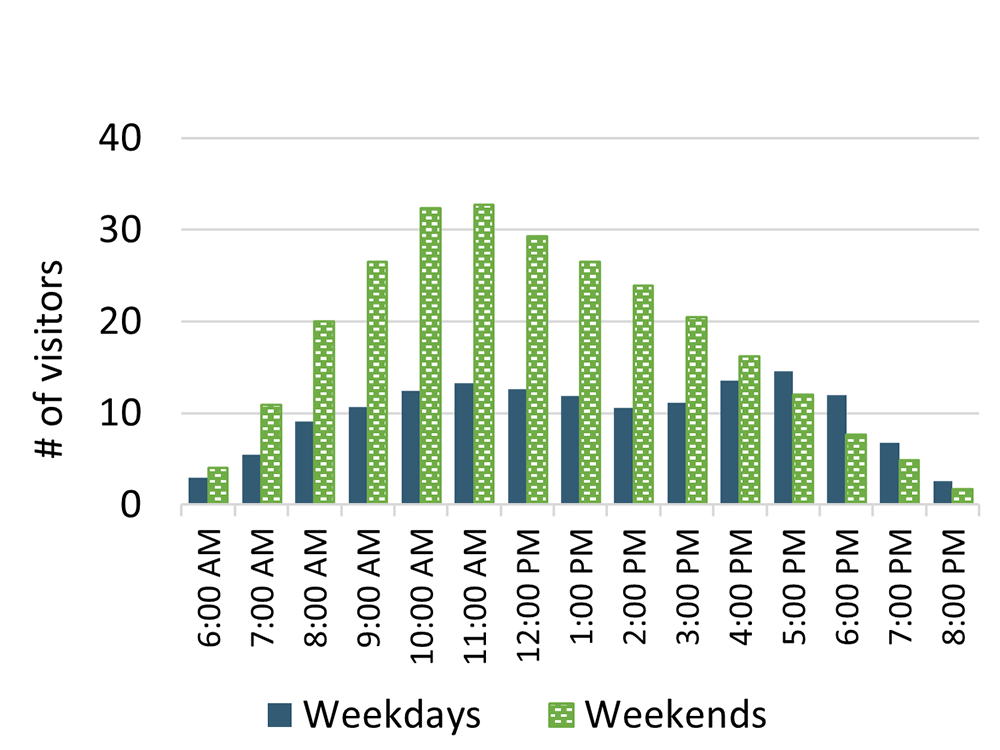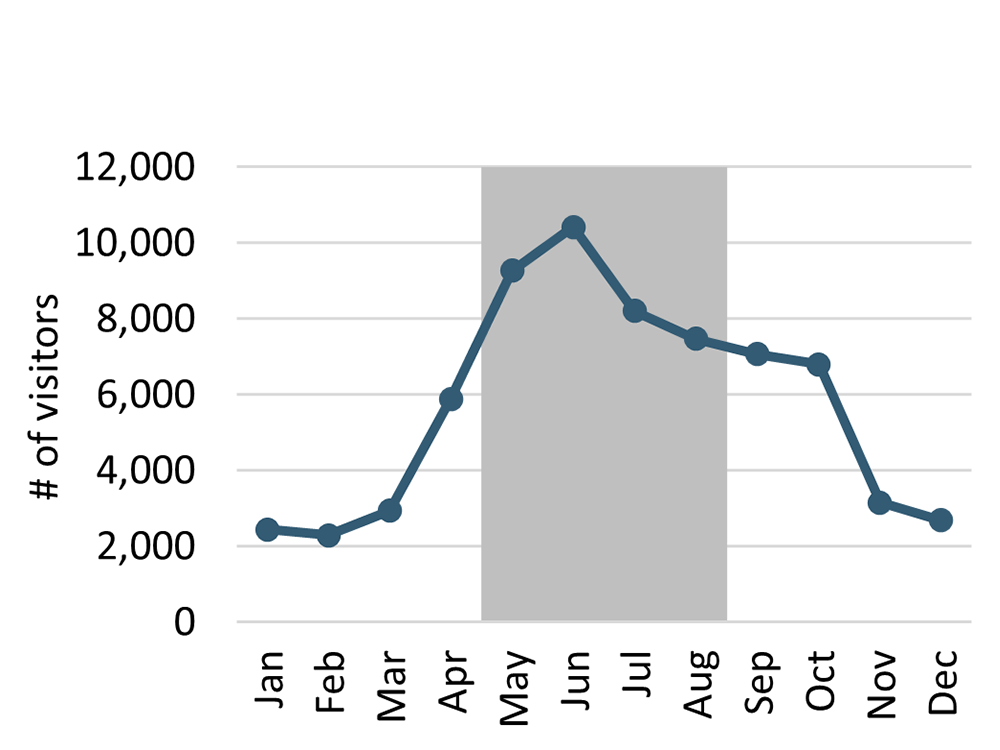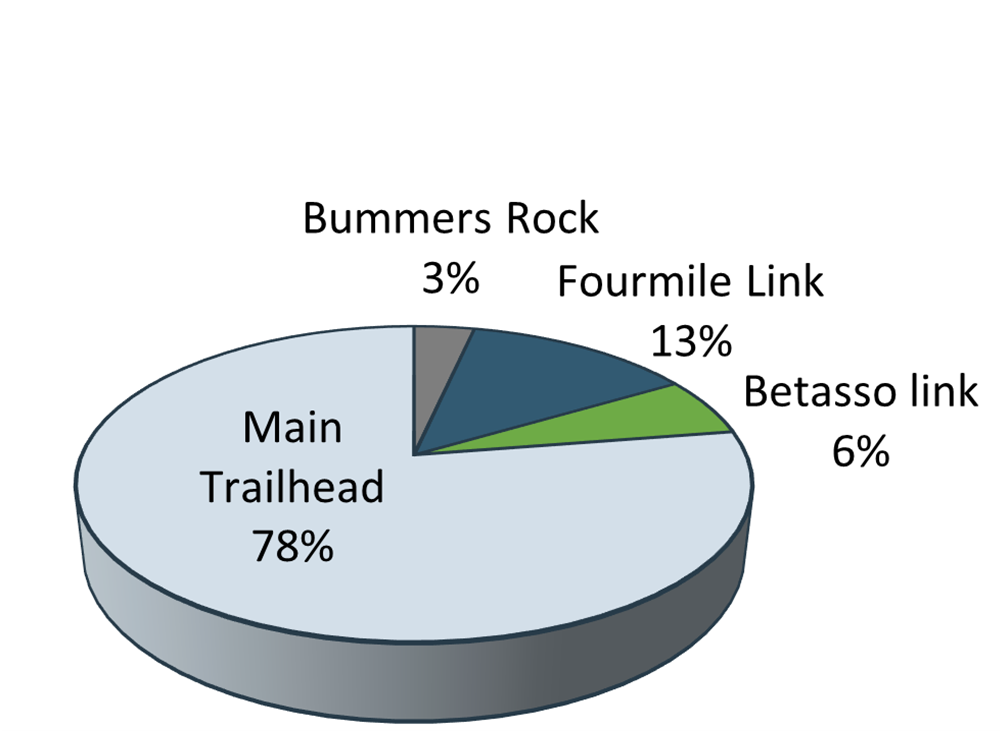Mountain vistas, views of golden plains, scenic trails, diverse habitats, and a rich heritage make Betasso Preserve a favorite destination in the foothills.
Betasso Preserve
Trails
-
Betasso Link
1.3 miles – Difficult




-
Canyon Loop
3.3 miles – Moderate/Difficult
Bike Direction: Counterclockwise
Bikes prohibited Wednesdays and Saturdays




-
Loop Link
0.8 miles – Moderate
Bikes prohibited Wednesdays and Saturdays




-
Benjamin Loop
2.4 miles – Moderate
Bike Direction: Clockwise
Bikes prohibited Wednesdays and Saturdays




-
Fourmile Link
0.8 miles – Moderate
Horses can only access from the Benjamin Loop due to steep terrain and stairways
Bikes prohibited Wednesdays and Saturdays




-
Blanchard Trail
0.3 miles – Moderate
This is a short trail made up of 177 steps that lead to the Blanchard Cabin




-
Bummer’s Rock Trail
0.3 miles – Moderate




Regulations

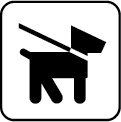





Trailhead Amenities
Keep in Mind
- Hikers and equestrians are encouraged to visit on Wednesdays and Saturdays when bikes are not on the trail.
- Hiking, horseback riding, and dog-walking (on leash) are allowed on all trails.
- Due to the popularity of Betasso Preserve, trail sharing and etiquette is particularly important.
- The Benjamin Loop trail is very steep, narrower than 3-feet wide, and is particularly challenging for novice equestrians and mountain bikers.
- Equestrians and mountain bikers are strongly encouraged to walk the trail system before riding.
- Equestrians can access the Fourmile Link trail from the Benjamin Loop only. There is steep terrain and stairways between Fourmile Creek and Fourmile Canyon Drive.
- E-bikes, electric unicycles, hoverboards, Onewheels, Segways, and similar micro-mobility devices and electric rideables are prohibited.
Photos
Open Gallery in New WindowRoad Project: Boulder County Public Works and its contractor, Dietzler Construction Corp., will replace two aging culverts at the intersection of Sugarloaf and Betasso roads. During construction, travel will be reduced to one lane and a three-way traffic signal will be installed to control the flow of vehicles and bicycles through the work zone. The signals will be in use 24-hours a day, seven days a week until the project is completed, which is anticipated for November 2025. The project team is working with Sugarloaf Fire and the Boulder County Sheriff’s office to ensure safe egress should emergency services be required. Access to Betasso Preserve will be maintained. Cyclists will be allowed through the work zone, but riders should use the Betasso Link trail or drive through the zone to reach the trailhead, if possible.
Along Colorado’s Front Range the sweeping grasslands of the Great Plains rise to meet the rugged peaks of the Southern Rocky Mountains. Where they meet we find the foothills – a zone of geological and biological transition. Foothills ecosystems are made up of diverse landforms such as cliffs, canyons, hills, and meadows. Betasso Preserve has 1,151 acres of plant communities ranging from grasslands, to shrublands to forests that provide habitats for a rich diversity of wildlife.
Mammals
- Abert’s squirrel
- Black bear
- Bobcat
- Coyote
- Least chipmunk
- Little brown bat
- Mountain lion
- Mountain vole
- Mule deer
- Nuttall’s (mountain) cottontail
- Northern pocket gopher
- Red fox
- Rock squirrel
- Striped skunk
Birds
- American crow
- American kestrel
- American robin
- Black-billed magpie
- Broad-tailed hummingbird
- Chipping sparrow
- Common nighthawk
- Common raven
- Cooper’s hawk
- Dark-eyed junco
- Downy woodpecker
- Mountain bluebird
- Mountain chickadee
- Mourning dove
- Northern flicker
- Plumbeous vireo
- Pygmy nuthatch
- Red-tailed hawk
- Steller’s jay
- Turkey vulture
- Violet-green swallow
- White-breasted nuthatch
- Wild turkey
- Western tanager
Reptiles
- Bullsnake
- Eastern fence lizard
White Wildflowers
- Mouse ear chickweed (Cerastium spp)
- Nodding onion (Allium cernum)
- Porter aster (Aster porteri)
- Pussytoes (Antennaria sp)
- Western white clematis (Clematis ligusticifolia)
- Yarrow (Achillea lanulosa)
Yellow Wildflowers
- Blanket flower (Gaillardia aristata)
- Golden banner (Thermopsis divaricarpa)
- Goldenrod (Solidago sp)
- Gumweed (Grindelia squarrosa)
- Heart-leaf arnica (Arnica cordifolia)
- Hairy false golden aster (Heterotheca villosa)
- Little sunflower (Helianthus pumilus)
- Sulphur flower (Eriogonum umbellatum)
- Western wallflower (Erysimum asperum)
- Whiskbroom parsley (Harbouria trachypleura)
- Yellow evening primrose (Oenothera sp)
- Yellow stonecrop (Amerosedum lanceolatum)
Pink, Orange & Red Wildflowers
- Fairy trumpet – Scarlet gilia (Ipomopsis aggregata)
- Spotted coralroot (Corallorizha maculata)
- Wild geranium (Geranium caespitosum)
Purple & Blue Wildflowers
- Common harebell (Campanula rotundifolia)
- Fireweed (Chamerion angustifolium)
- Greenleaf (low) penstemon (Penstemon virens)
- Larkspur (Delphinum nelsoni)
- Lanceleaf chiming bells (Mertensia lanceolata)
- Mountain larkspur (Delphinium ramosum)
- One-sided penstemon (Penstemon secundiflorus)
- Pasqueflower (Pulsatilla patens)
- Smooth aster (Aster laevis)
- Tall chiming bells (Mertensia ciliata)
- Western spiderwort (Tradescantia occidentalis)
Green Wildflowers
- Fringed silver sage (Artemisia frigida)
- White sage (Artemisia ludoviciana)
Shrubs
- Kinnikinnick
- Oregon grape
- Prickly rose
- Yucca
Trees
- Aspen
- Common juniper
- Douglas fir
- Ponderosa pine
Betasso Preserve is underlain by one of the oldest rock types in Boulder County, Boulder Creek granodiorite. This rock formed from molten material that cooled and hardened very slowly and was then forced upward. Mountain uplift occurred several times in the area. Each time the mountains were eroded down by water and wind to low, rolling hills or flat plains. Around 65 million years ago, the Laramide uplift began, forming great peaks and creating rich minerals, including gold and silver. Today, erosion is the dominant force sculpting Betasso Preserve. The high mountain snow melts each spring allowing you to see how the stream flow continues to shape the landscape.
Homesteading, Mining, and Ranching
In the 1870s, sawmills and mining operations sprang up along Boulder and Fourmile canyons. The town of Orodell was established at the junction of these two canyons, immediately adjacent to the present Betasso Preserve. A general store, post office and school served the visitors and residents of Orodell. Five stage coaches passed through Orodell daily, en route from Boulder to Nederland. In 1883 most of Orodell was destroyed by a fi re and in 1894 the sawmill and gold mill were destroyed in a flood, never to be rebuilt.
Eighteen years passed before the land above Orodell (now Betasso Preserve) was homesteaded. In 1912 the Blanchard family homesteaded 160 acres. In 1915 Steve Betasso, a hard rock miner from Fourmile Canyon, purchased this small ranch. Steve, together with his sons Dick and Ernie, expanded the ranch with their profits from gold and tungsten mining. Using the Betasso Ranch for their cattle operations, Dick and Ernie wintered the cattle on the ranch, driving the herds to Mammoth Basin in the summer to feed on the lush, high-country rangelands.
Boulder County’s First Open Space Purchase
In 1976, Boulder County purchased 712 acres of the ranch from Ernie Betasso. Ernie wanted others to enjoy his land as he had. Until his death in 1983, Ernie helped the Boulder County Parks and Open Space department oversee Betasso Preserve.
Subsequent purchases include the acquisition of the 391 acre Benjamin Property in 2007. The open space now totals 1,181 acres enjoyed by people and wildlife.



